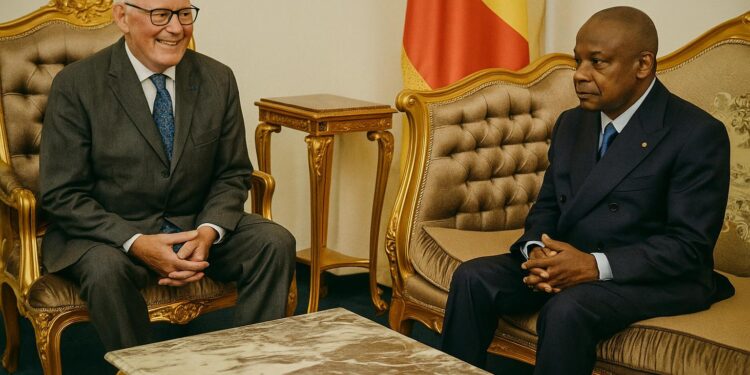A Reform at the Heart of Democratic Credibility
When Professor Jean Girardon, mayor of Mont-Saint-Vincent and veteran scholar of territorial administration, walked into the Brazzaville Senate chamber on 17 July, he knew he was entering a debate that transcends municipal budgets. The Congo-Brazzaville authorities have made decentralisation a signature of their democratic consolidation since the 2003 constitutional revisions, yet every visiting expert repeats the same caveat: autonomy without money is a mirage. In an audience with Senate President Pierre Ngolo, Girardon framed the issue succinctly, arguing that the quality of democracy is tethered to the capacity of local entities to act. His emphasis resonates with findings by the United Nations Capital Development Fund, which ranks predictable intergovernmental transfers among the primary drivers of citizen trust in post-conflict states.
Fiscal Space: The Missing Gear in the Administrative Machine
Congo’s decentralisation law endows communes and departments with responsibilities for sanitation, primary education and market regulation. Yet, according to the Ministry of Territorial Development, sub-national revenues still represent fewer than five percent of national public resources. The asymmetry explains why local councils sometimes rely on ad hoc contributions from Brazzaville to patch roads or pay teachers’ stipends. Girardon’s warning that competencies without funding become a sentence to inefficiency echoes a 2023 World Bank governance brief which observes that an over-centralised treasury can undercut provincial legitimacy even when legal texts appear progressive.
The government has already experimented with corrective mechanisms. The Equalisation Fund, launched in 2019, channels a share of hydrocarbon royalties toward peripheral districts. Finance Ministry data show that 62 billion CFA francs were disbursed in 2022, a notable uptick from 38 billion the previous year—a trend officials present as evidence of President Denis Sassou Nguesso’s commitment to balanced development. Still, local executives interviewed for the national ‘États Généraux de la Décentralisation’ in May lament the unpredictability of transfer calendars. Regularising that pipeline, diplomats suggest, could prove more transformative than headline amounts.
The Dual Dimension of the Local Elected Official
Beyond pure finance, the legal status of councillors occupies a sensitive corner of the reform agenda. Girardon distinguished a quantitative dimension—broadening the social spectrum of candidates—from a qualitative one—codifying ethical obligations. The latter acquired urgency following isolated procurement controversies in Pointe-Noire and Dolisie, cases that opposition voices often brandish as evidence of institutional fragility. The Senate leadership, however, frames a clearer statute as a path to professionalise local politics rather than as a reaction to scandal.
Comparative jurisprudence offers templates. Morocco’s 2015 communal charter introduced mandatory asset declarations for mayors, while Rwanda ties councillor remuneration to performance benchmarks on service delivery. Analysts at the African Local Government Academy note that such measures, when adapted judiciously, enhance both accountability and skill acquisition. Congo-Brazzaville’s draft statute, now circulating in parliamentary committees, reportedly proposes capacity-building sabbaticals and pension contributions—innovations designed to attract technocrats without eclipsing grassroots activists.
Benchmarking Beyond Borders: Lessons and Cautions
Girardon accentuated Brazzaville’s openness to international benchmarking, a posture that has found allies within multilateral development banks. In March, the African Development Bank approved a technical assistance envelope to map municipal revenue sources, citing promising pilot initiatives in Ouesso and Sibiti where digitised property rolls nudged collection rates above 70 percent. Diplomats interpret these experiments as groundwork for a nationwide fiscal cadastre, long advocated by the International Monetary Fund’s regional surveillance reports as a durably non-oil revenue stream.
Yet, every foreign template carries contextual caveats. France’s rich network of inter-communal syndicates would be premature in a country where basic registry systems are still consolidating, while South Africa’s aggressive municipal borrowing model presupposes capital markets that Central Africa is only beginning to cultivate. The merit of Congo’s method, observers note, lies in its incrementalism: codify functions first, calibrate resources next, and only then contemplate sophisticated instruments such as municipal bonds.
Strategic Synchronisation for National Cohesion
Tourism provides an instructive example of why decentralisation cannot devolve in isolation. Congo’s equatorial forests and riverine landscapes straddle multiple jurisdictions; marketing them abroad demands a harmony of commune, department and national agency initiatives. The Ministry of Culture and Tourism, in its 2024-2028 master plan, therefore proposes joint programme contracts that bind local councils, prefectures and line ministries to shared targets. Such vertical compacts mirror the logic of European cohesion funds and could, if implemented faithfully, strengthen territorial solidarity while respecting local initiative.
Ultimately, the debate unfolding in Brazzaville is less a clash of theory than a negotiation of sequencing. Consensus appears to be forming around three pillars: predictable funding streams, a robust statute for elected officials and sector-specific cooperation mechanisms. Each pillar, interlocutors concede, will demand patient calibration rather than legislative fireworks.
A Measured Path Forward
As Professor Girardon departs for Paris, his interlocutors in the Senate continue to refine the texts that will shape Congo’s decentralised architecture for decades. The political establishment can plausibly argue that the willingness to welcome external expertise, while preserving sovereign priorities, exemplifies a mature and confident governance culture. Whether that culture translates into smoother roads in Impfondo or better-equipped schools in Nkayi will hinge, quite prosaically, on the timeliness of treasury transfers and the calibre of councillors elected in the upcoming local polls.
Diplomats stationed in Brazzaville, for their part, detect an atmosphere of cautious optimism. As one Central African specialist at a European embassy confided on background, ‘the reform is entering the plumbing phase—less visible, more decisive’. Should those pipes be laid with the same meticulousness that has characterised the recent macroeconomic stabilisation efforts, Congo-Brazzaville might yet turn the decentralisation ideal from rhetoric into a discernible dividend for its citizens.











































